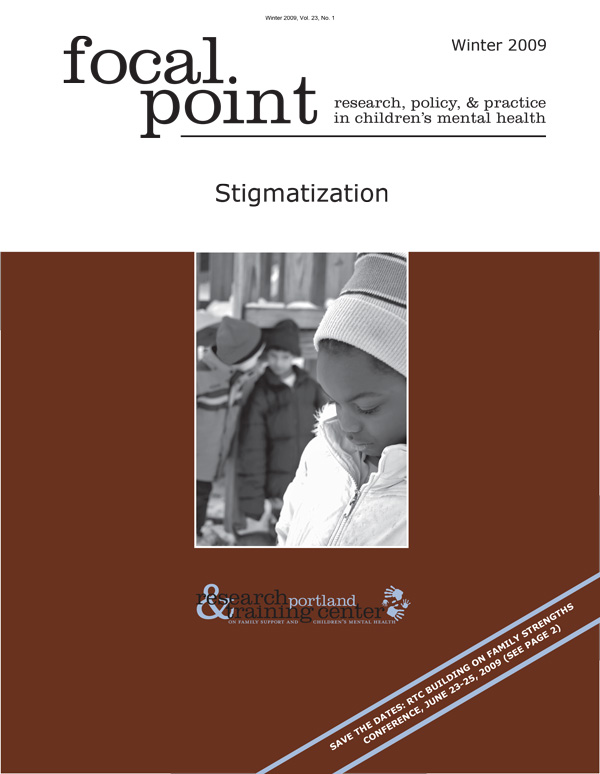Focal Point Winter 2009

"Stigmatization" (2009), v.23(1)
Stigmatization can result in exclusion of and discrimination against the stigmatized individual. This issue of Focal Point provides state-of-the-art information about stigmatization, its causes and consequences, and strategies and programs for alleviating it.
Access Articles in this Issue
-
Introduction: Stigmatization
Gowen, L. K., & Walker, J. S.
Not much is understood about the sources, effects, and impact of the stigmatization of young persons. This introduction reports on the results of two web-based surveys—one for youth and one for caregivers—which captured experiences of stigmatization.
-
Parent/Professional Thoughts About the Use of the Term "Seriously Emotionally Disturbed"
Rice, T.
This brief article outlines parents' and professionals' suggested alternatives to the term "Seriously Emotionally Disturbed" for describing a child who experiences serious emotional and/or behavioral difficulties.
-
What Do American Adults Think of Children's Mental Health Problems? Findings and Lessons From the First National Study
Pescosolido, B. A., & Martin, J. K.
Because families' healthcare-related decisions are informed by the advice of friends, teachers, neighbors, and others, it is important to understand how the general public views mental health conditions. This article discusses research on the public's attitudes toward children with mental health conditions.
-
Young People's Stigmatization of Peers With Depression and ADHD
Walker, J. S.
An important first step to reducing the stigmatization of children and adolescents with mental health conditions is to understand the thought processes that lead to stigmatization. This article describes findings from a survey focused on young people's beliefs about their peers who have ADHD and depression.
-
Stigma vs. Stigmatization
Walker, J. S.
This note from the editor of Focal Point asks readers to consider whether the word "stigma" or "stigmatization" is more appropriate for describing the prejudice experienced by many people with mental health conditions.
-
My Experiences With Stigma, Self–Worth, and Roles
McWade, M.
Matthew, a peer mentor, discusses how his experiences providing peer support transformed his sense of self.
-
A Young Adult Discussion on Stigma Had By the Massachusetts DMH Statewide Youth Advisory Council
McWade, M.
This article relays young people's first-person accounts of stigmatization and how they dealt with its effects.
-
The Family Acceptance Project: Understanding the Experiences of LGBT Youth
Ryan, C.
This article explores how families' responses to discovering their child is lesbian, gay, bisexual, or transgender affect the child's self-esteem, behavior and mental health.
-
Addressing the Stigmatization of Mental Illness Experienced by Children
Rafacz, J. D., O'Shaughnessy, J. & Corrigan, P. W.
This article describes the research on efforts to reduce stigmatization of people with mental health conditions. Most of this research has involved adults; however the research base can be used to inform efforts to reduce the stigmatization towards adolescents and children.
-
STARS: Youth–Driven Mental Health Stigmatization Reduction Campaigns in Schools
Quartly, S.
This article explains how the System Transformation of Area Resources and Services (STARS) project works, gives specific examples of STARS-funded and student-created mental health stigmatization reduction campaigns, and discusses program evaluation efforts.
-
Stigma and the Cycle of Avoidance: Why Young People Fail to Seek Help for Their Mental Distress
Biddle, L., & Gowen, L. K.
The research discussed in this article reveals that, in addition to financial and other barriers to care, youth with mental health disorders may not seek help because of the shame they experience from the public's stigmatization of their conditions.
-
Breaking the Silence: Parents' Experiences of Courtesy Stigmatization in the Workplace
Rosenzweig, J. M., Brennan, E. M., & Malsch, A. M.
This article discusses how parents deal with courtesy stigmatization at work. It also includes information about what employers can do – and are doing – to increase awareness about and supports for employees who have children with mental health disorders.